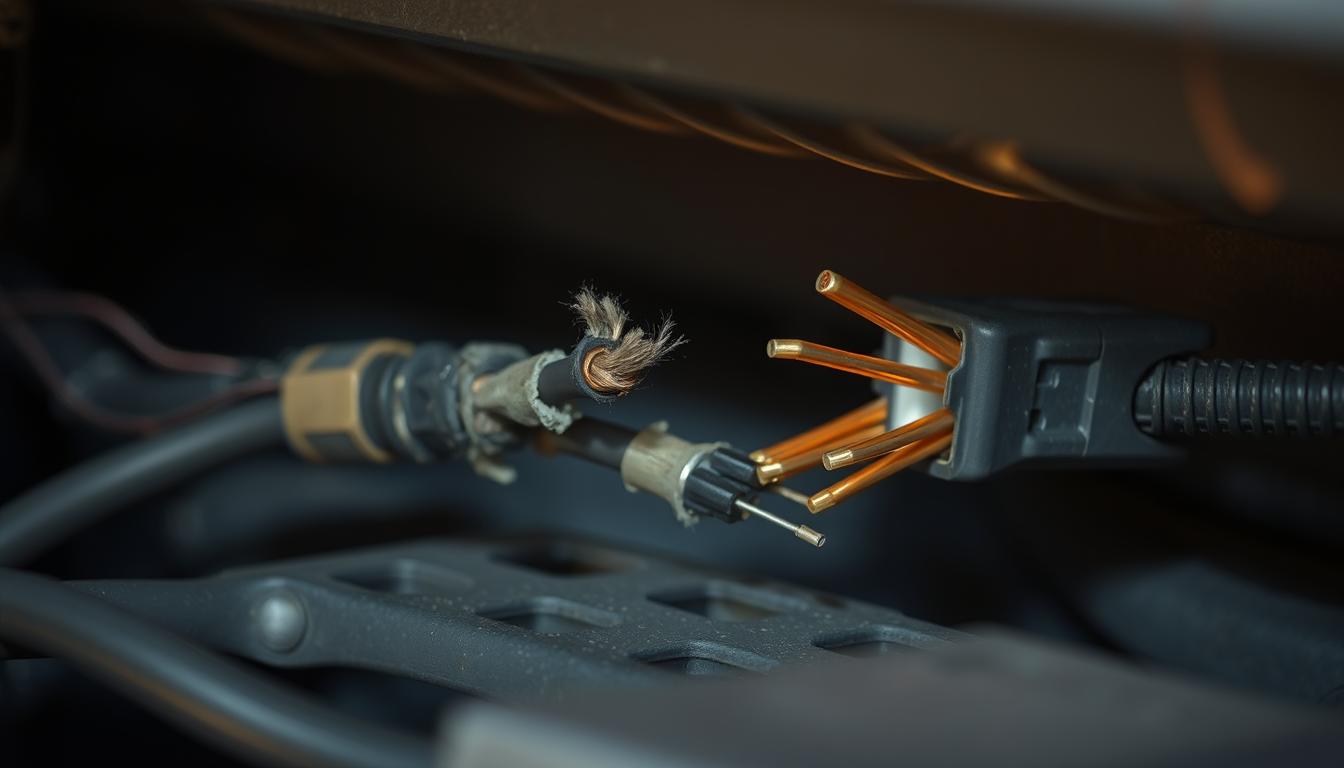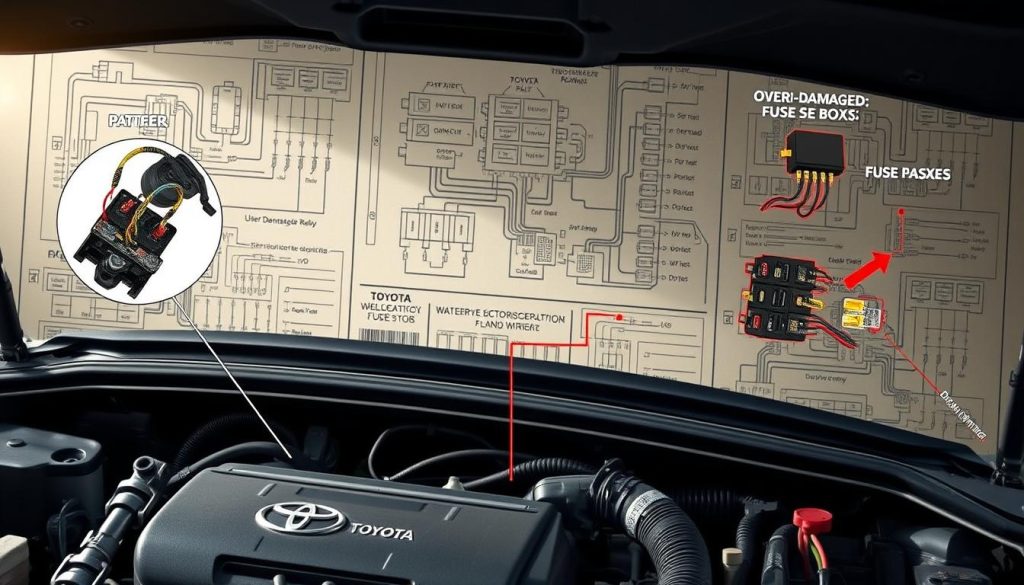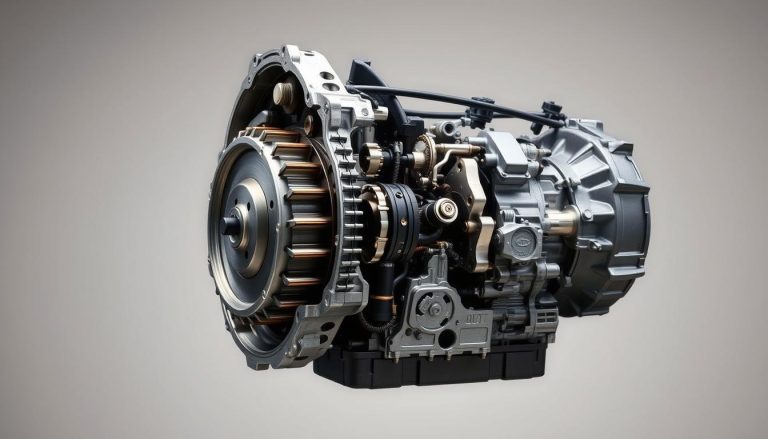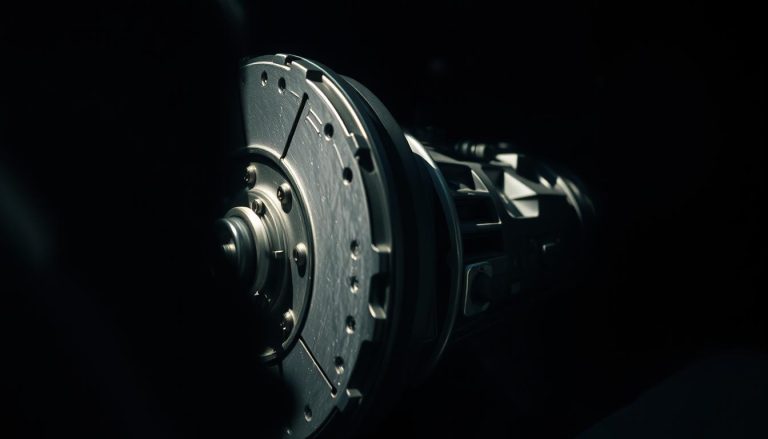Toyota Electrical Shorts: Causes & Solutions
Toyota cars are known for their dependability, but they can face electrical problems. These issues can affect how well the car works. It’s important to fix these problems quickly to keep the car running right and avoid expensive fixes.
This guide will help you understand the electrical troubles in Toyota cars. We’ll look at what causes these problems, what signs to watch for, and how to fix them. This way, Toyota owners can keep their cars’ electrical systems in top shape.
If you’re trying to solve electrical issues in your Toyota or need a pro to fix it, knowing the common problems and solutions is key. This detailed guide will give you the tools to handle Toyota electrical shorts on your own.
Understanding Toyota Electrical Shorts
Electrical shorts in Toyota vehicles can cause many problems. They disrupt the car’s systems, leading to issues like flickering lights. It’s important to know the signs to fix these problems.
To diagnose electrical shorts in Toyotas, you need to understand the electrical system. This includes the battery, alternator, and wiring. Even small problems in these areas can cause big issues.
Knowing how electrical problems work in Toyotas helps you fix them. This saves time and money. It also keeps your car running well.
Common Causes of Electrical Issues in Toyota Vehicles
Many things can cause electrical problems in Toyota cars. These issues can make the car not work right and might get worse if not fixed fast. Knowing what causes these problems helps with keeping the car running well and fixing it quickly.
Dead or Weak Battery
A dead or weak battery is a big reason for electrical troubles in Toyotas. It can happen because the battery gets old, the weather is too harsh, or there’s an electrical problem that uses up the battery’s power. A bad battery makes it hard for the car to start and use its electrical parts well.
Faulty Alternator
The alternator is key for keeping the battery charged and running the car’s electrical systems when the engine is on. If the alternator doesn’t work right, it can drain the battery and cause electrical shorts in Toyotas. Fixing the alternator quickly stops more damage to the car’s electrical system.
Malfunctioning Starters
Starters that don’t work right are another big problem for Toyotas. Starters that can’t turn the engine on might have electrical or mechanical issues. Keeping the starter system working well helps the car stay reliable.
Here is a breakdown of the causes:
| Cause | Description |
|---|---|
| Dead or Weak Battery | Results from natural degradation, weather conditions, or electrical faults. |
| Faulty Alternator | Leads to a drained battery and common electrical shorts. |
| Malfunctioning Starters | Involves electrical or mechanical faults preventing engine engagement. |
Toyota Electrical Shorts
Electrical shorts in Toyotas can come from many problems. These include damaged wiring, faulty parts, and bad connections. These issues can cause your car to act strangely, like losing power suddenly or lights flickering.
Fixing these problems is key to keeping your Toyota safe and running well. It’s important to check the electrical systems carefully. Start by looking at the wiring for any damage or wear.
Here’s a list of common causes and signs of electrical shorts in Toyotas:
| Cause | Symptoms | Solution |
|---|---|---|
| Worn or Damaged Wiring | Flickering lights, intermittent power loss | Replace the affected wiring |
| Faulty Electrical Components | Vehicle fails to start, unexpected shutdowns | Replace or repair the malfunctioning components |
| Improper Connections | Intermittent electrical failures, erratic behavior of electrical systems | Ensure all connections are secure and corrosion-free |
Regular checks are part of good Toyota electrical maintenance. This helps prevent shorts and keeps your car running smoothly. Being proactive means your car stays safe and ready to go, without unexpected problems.
Identifying Symptoms of Electrical Shorts in Toyotas
Spotting Toyota electrical problems early is key. Look out for flickering dashboard lights, which often mean a problem with the electrical supply. Slow engine cranking is another sign, pointing to battery or starter system issues. Catching these signs early helps avoid bigger electrical failures and makes fixing Toyota wiring issues easier.
Flickering Dashboard Lights
Flickering dashboard lights usually point to wiring issues in Toyotas. This happens when the electrical current is unstable. This can be due to loose wires, corroded connections, or damaged parts. Fixing these problems quickly helps prevent more electrical issues.
Slow Engine Cranking
Slow engine cranking is another sign of electrical problems in Toyotas. It often means the starter motor isn’t getting enough power. This can be because of a weak battery or problems with the starter relay and wiring. Fixing slow engine cranking early is important to avoid bigger damage to the electrical systems.
Diagnosing Toyota Electrical Shorts
Diagnosing Toyota electrical shorts needs a careful plan to find the problem in the vehicle’s electrical system. First, check the battery, alternator, and starter. Use a multimeter to see if they have the right voltage and work right. Look for damage, corrosion, or bad connections in the wiring and connectors, as these often cause shorts.
Tools like automotive oscilloscopes help a lot in fixing Toyota electrical issues. They show detailed info about the electrical system’s behavior. This helps find where the short is. Test under different conditions to make sure the diagnosis is right.
Using a checklist helps make sure you check everything in the vehicle’s electrical system:
- Battery Condition Check
- Alternator Functionality Test
- Starter Performance Evaluation
- Visual Inspection of Wiring and Connectors
- Use of Diagnostic Tools for Detailed Analysis
Following these steps when diagnosing Toyota electrical shorts makes the process better. It leads to quick and correct fixes. Regular checks and maintenance help catch problems early, stopping them from getting worse.
How to Fix Electrical Shorts in Toyotas
Fixing electrical shorts in Toyotas needs a detailed plan. Issues like bad batteries or corroded terminals can cause problems. Finding the exact cause is key to fixing it right.
By following these steps, you can keep your car’s electrical system working well.
Replacing Worn Components
Worn or faulty parts often lead to electrical shorts. It’s important to replace key items like batteries, alternators, and starters. Always choose Original Equipment Manufacturer (OEM) parts for the best fit and reliability.
Ignoring worn parts can make electrical issues worse and cause bigger problems.
Addressing Wiring Issues
Wiring problems also need attention. Look for signs of wear, loose connections, or corrosion in the wiring. Fixing or replacing these can stop short circuits and improve your Toyota’s performance.
Using the right tools and knowledge helps fix these issues effectively.
The Role of the Alternator in Electrical Shorts
The alternator is key to keeping your car’s electrical system running. It charges the battery and powers accessories when the engine is on. If the alternator fails, it can cause battery problems and make electrical parts act strangely.
It’s important to know how the Toyota alternator works to spot problems. The alternator turns mechanical energy into electrical energy. This keeps all electrical systems working and the battery charged. If it doesn’t work right, it can cause electrical shorts in your Toyota.
- Battery Drain: A bad alternator means the battery can’t hold a charge. This leads to needing jumps or new batteries often.
- Component Failure: Not enough power can make lights, radios, and sensors not work right.
- Electrical Shorts: A broken alternator can cause electrical shorts. This can damage many systems in your car.
Let’s look at how alternator problems affect your car’s electrical system:
| Symptom | Result of Toyota Alternator Issues | Impact on Electrical System |
|---|---|---|
| Flickering Lights | Intermittent power supply causing lights to flicker. | Decreased visibility and possible safety risks. |
| Slow Cranking | Insufficient power to start the engine smoothly. | Hard starts and unreliable vehicle operation. |
| Dead Battery | Failure to recharge the battery during operation. | Inoperable vehicle needing external start-up aid. |
Preventative Maintenance Tips for Toyota Electrical Systems
Keeping your Toyota’s electrical system in check is key to its long life and dependability. Regular Toyota electrical maintenance helps avoid preventing electrical issues in Toyota vehicles. This way, you can dodge sudden breakdowns.
Regular Inspections
Getting your car checked by a pro is vital for Toyota electrical upkeep. These inspections can spot issues early, like damaged wires or worn-out parts. Make sure to book these checks as Toyota suggests to keep everything running smoothly.
Keeping Connections Clean
Clean connections are essential for your car’s electrical system to work right. Dirt and rust can cause problems. So, clean your battery terminals and connections often to avoid issues.
Following these tips will keep your Toyota’s electrical systems in top shape. This reduces the chance of unexpected electrical problems.
Why Professional Diagnosis is Crucial
Keeping your Toyota’s electrical system running smoothly and safely is key. While some simple fixes can be done by car owners, complex problems need a pro. A professional Toyota electrical diagnosis is essential for this.
Experts use special tools for an electrical system check in Toyota. These tools help them understand and fix problems correctly. This way, they avoid making mistakes that could harm your car or make it unsafe.
A certified technician’s skills are vital. They can find and fix problems fast, saving you time and keeping your car running well. Choosing a professional Toyota electrical diagnosis means your car’s electrical system will work perfectly. This protects your investment and gives you peace of mind.
Common Misconceptions About Toyota Electrical Shorts
Many myths surround Toyota electrical shorts, often linked to DIY fixes. While tackling simple tasks yourself can be fulfilling, it’s key to know your limits. Sometimes, you need a pro for more complex issues.
DIY Fixes vs. Professional Repairs
One common myth is that all electrical problems can be fixed at home. While simple tasks like replacing a fuse or bulb are doable, complex issues need a deeper understanding of the vehicle’s systems.
Trying to fix complex electrical issues without the right skills can be risky. For example, messing with wiring or alternators without knowing what you’re doing can make things worse. This can lead to more expensive repairs later on.
Here’s a clear comparison to illustrate the differences:
| Task | DIY Fixes | Professional Repairs |
|---|---|---|
| Blown Fuse Replacement | Feasible with basic knowledge and a fuse kit | Often unnecessary, as it’s a straightforward task |
| Replacing Headlight Bulbs | Can be done with minimal tools and guidelines | Recommended if unsure about the process |
| Fixing Wiring Issues | Risky without proper diagnostic tools | Highly recommended for safety and accuracy |
| Alternator Diagnostics | Not advisable due to complexity | Essential for precise problem identification |
So, while DIY fixes can work for some minor issues, knowing when to call a pro is important. It keeps your vehicle safe, reliable, and in good shape, debunking myths about Toyota electrical repairs.
Case Studies: Solving Electrical Shorts in Toyota Cars
Looking at real cases of fixed electrical shorts in Toyota cars offers deep insights. It shows how experts diagnose and fix these issues. This knowledge helps Toyota owners and technicians solve electrical problems.
Real-Life Examples
A 2015 Toyota Camry owner faced electrical shorts. This caused flickering dashboards and random stalling. After many checks, a frayed wire was found. Replacing and securing the wire fixed the problem.
A 2012 Toyota Corolla had trouble starting. It was due to a corroded ground cable. Cleaning and replacing the cable fixed the issue, making the electrical system stable.
Lessons Learned
These cases teach us important lessons:
- Thorough Diagnostics: Detailed checks are key to finding electrical shorts, as seen in the 2015 Camry’s wiring.
- Component Replacement: Replacing damaged parts, like the Corolla’s corroded cable, is vital for fixing electrical problems.
- Preventative Maintenance: Regular checks can catch issues early, preventing expensive repairs. This keeps the electrical system in good shape.
These examples show the value of careful checks, timely replacements, and regular maintenance. They ensure your car’s electrical system works well for a long time.
Frequently Malfunctioning Components in Toyota Electrical Systems
In Toyota vehicles, some parts in the electrical system wear out quickly. This leads to more frequent issues. Knowing which parts are at risk is key to catching problems early.
- Alternator: This key part can have problems because it’s used a lot. It affects the electrical system’s performance and causes various issues.
- Battery: The battery is often the cause of electrical problems in Toyotas. It might fail due to age or extreme temperatures.
- Wiring: Worn or damaged wiring is a common problem. It can cause short circuits and unreliable connections.
Keeping these parts in good shape can prevent electrical failures. Regular checks and quick fixes help keep your car running smoothly and safely.
| Component | Signs of Failure | Recommended Action |
|---|---|---|
| Alternator | Dim lights, frequent battery drain | Inspect and replace if necessary |
| Battery | Slow engine cranking, battery warning light | Test and replace if over 3 years old |
| Wiring | Intermittent power loss, short circuits | Check for wear and consider rewiring |
Conclusion
Fixing Toyota electrical shorts means knowing your car’s electrical system well. Spotting trouble signs like flickering lights or slow starts is key. This lets you act fast.
Figuring out the cause, like a dead battery or bad starter, helps fix the problem. Replacing old parts and making sure connections are tight keeps your car’s electrical system working right.
Regular checks and professional help are vital to avoid electrical issues. They catch and fix problems early. This keeps your Toyota running well.
Knowing how Toyota’s electrical parts work helps car owners keep their cars running smoothly. This guide offers practical tips for fixing electrical issues. Getting help from a pro keeps your Toyota in top shape, giving you peace of mind and reliable driving.
FAQ
What are common causes of electrical issues in Toyota vehicles?
Toyota vehicles can face electrical problems for many reasons. A dead or weak battery, a faulty alternator, or malfunctioning starters are common culprits. Worn or damaged wiring and bad connections can also cause electrical shorts.
How can I identify if my Toyota has an electrical short?
Signs of electrical shorts in Toyotas include flickering dashboard lights and slow engine cranking. You might also notice sudden power loss or a failure to start. Spotting these signs early can help avoid bigger electrical problems.
What steps can I take to diagnose electrical shorts in my Toyota?
To diagnose electrical shorts, start by testing the electrical system. Check the battery, alternator, and starter. Also, look for damage, corrosion, or bad connections in the wiring. Advanced tools can help find the exact problem for fixing.
How should I fix electrical shorts in my Toyota?
To fix electrical shorts, replace worn or bad parts like the battery, alternator, or starter. You might also need to fix wiring issues like worn insulation or loose connections. Always use OEM parts and follow Toyota’s repair guidelines for reliable fixes.
What role does the alternator play in Toyota’s electrical system?
The alternator is key in Toyota’s electrical system. It charges the battery and powers systems while the engine runs. A failing alternator can cause battery drain and erratic electrical component behavior.
Why is preventative maintenance important for Toyota’s electrical systems?
Regular maintenance keeps Toyota’s electrical system healthy. Qualified technicians can spot issues early during inspections. Keeping connections clean and corrosion-free ensures good electrical flow and prevents shorts.
When should I seek professional diagnosis for electrical issues in my Toyota?
For minor issues, you might handle them yourself. But for complex problems, a pro is needed. They have the right tools and knowledge for safe and effective repairs.
What are the common misconceptions about Toyota electrical shorts?
Many think DIY fixes work for all problems. But complex issues need a pro. Professional repairs save time, money, and prevent dangers.
Can you provide examples of real-life electrical shorts in Toyota vehicles and their solutions?
Real-life examples show common issues and how to fix them. These stories help owners and technicians learn from others. They offer valuable lessons for troubleshooting and fixing electrical problems.
Which components in Toyota’s electrical system are most prone to malfunction?
The alternator, battery, and wiring often malfunction due to wear and stress. Catching these issues early and maintaining these parts can prevent major damage and keep your vehicle reliable.











